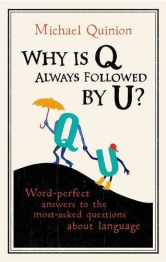Why is Q Always Followed by U?
From the blurb

Quinion’s answers to questions about the meanings and histories behind the quirky phrases, slang and language that we all use are set to delight, amuse and enlighten even the most knowledgeable word-obsessive.
Did you know that ‘Blighty’ comes from an ancient Arabic word? Or that Liberace cried his way to the bank so many times people think he coined the phrase? That cloud nine started out as cloud seven in 30s America? And that the first person to have their thunder stolen was a dismal playwright from Drury Lane?
Why is Q Always Followed by U? is full of surprising discoveries, entertaining quotations and memorable information. There are plenty of colourful tales out there, but Michael Quinion will help you discover the truth that lies behind the cock-and-bull stories.
From the introduction
Over the past ten years, people from all around the world, not all of them by any means with English as a first language, have been asking me about the meaning and history of words in the Questions and Answers section of my online World Wide Words newsletter and Web site.
I’ve been able to answer about 900 of them so far. This book contains revised, corrected, expanded and updated versions of the most popular couple of hundred.
Out of an extraordinarily mixed bag of questions on slang, grammar, vocabulary, word histories and regional usage, I’ve chosen a selection that mainly refer to words and phrases that you’re likely to recognize, no matter which variety of English you’re comfortable with. However, I’ve also included some pieces about quirky phrases (such as up in Annie’s room, behind the clock) that may no longer be living expressions, or even be recognized by anybody who hasn’t been drawing their pensions for a while, but which I hope will intrigue you.
Etymology is an uncertain science and we often have to say ‘we don’t know’ to a question about word origins. But we are at a time of huge advances in the resources available to researchers. Searchable digital archives of newspapers and books have transformed the field in the past decade or so, with discoveries being reported almost every week. Not only did many of the entries in this book have to be updated following their first appearance in the World Wide Words newsletter as a result of new information, but several even had to be revised during its compilation because researchers had found fresh material that altered our understanding of the provenance of terms. New sources of information are being created all the time, with the British Library newspaper archive becoming available as this book began to be compiled and the announcement of a new wave of newspaper digitization by Google as it was completed.
There was a BBC radio series about archaeology many years ago called The Changing Past, a clever title that pointed up the impact of new findings on our understanding of prehistory. The point is just as relevant to etymology and it is a constant delight not only to investigate the stories behind words and phrases and put them within their social and cultural milieu, but also — as a person who has been intrigued with and fascinated by English since a child — to be able at times to provide fresh insight into the way the language has evolved.
Publishing details
[Michael Quinion, Why is Q Always Followed by U? Word-perfect Answers to the Most-asked Questions about Language, published by Penguin Books; hardback, 352pp; UK list price £12.99, ISBN: 978-1-846-14184-3. Paperback, also from Penguin, list price £9.99, ISBN: 978-0-141-03924-4.]
